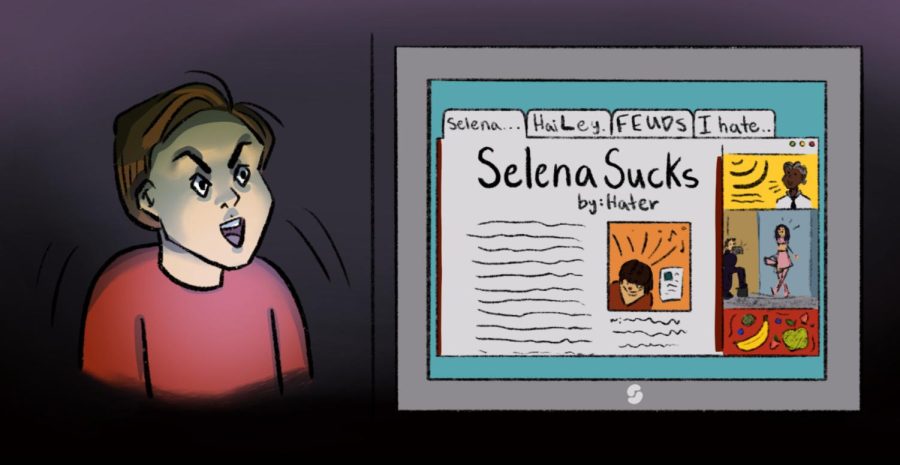Selena vs Hailey: Who’s in the wrong?
CAUGHT IN THE CYCLE: An Internet user goes through many articles on the Bieber and Gomez feud, completely engulfed in the pointless drama.
April 17, 2023
Team Selena or Team Hailey? Rare Beauty or Rhode Skin? The war between Hailey Bieber and Selena Gomez is taking over the internet as everyone debates over whether Hailey Bieber is obsessed with Gomez and who Justin Bieber loves more. The answer to who’s in the wrong is the Internet who is unnecessarily pitting them against one another, weaponizing racism and using the drama as an excuse to attack others online and celebrities, a common cycle we see recurring on the Internet, disguising ignorance and hatred as a part of cancel culture.
Resurfacing Instagram stories, TikToks and old videos have been taken out of context to make claims about the personal lives of the Biebers and Gomez. Some believe the Biebers are stuck in an unhappy marriage or that the three individuals are obsessed and jealous of one another. By overanalyzing posts from years ago, the Internet has used it to speculate tensions over the span of multiple years, which possibly never existed or isn’t as serious to the extent that the internet makes it out to be.
This same drama has once again been brought to public attention after recent posts from Bieber and Gomez were interpreted as condescending towards each other when both of them have confirmed through their social media they have no ill-feelings towards one another. When the Internet overreacts to these posts, it fuels unnecessary gossip and rumors, and in the process, compromises our morals to defend people and situations which nobody knows the truth about.
With how seriously the Internet takes celebrity gossip, everybody involved becomes heavily scrutinized for every move they make, and therefore attacked based on these assumptions. This gives people an opportunity to cyberbully those who disagree with them or celebrities through the anonymity of the Internet.
“Mainstream internet activism is a lot of calling out and blaming and shaming,” corporate diversity and inclusion consultant Aaron Rose told Vox. “Most public shaming is horizontal, that is, it’s not done to justifiably criticize people who are seriously dangerous, but to score brownie points against people who mean no harm.”
Often the perception is that leaving hate comments on a famous person’s social media or posting something to make fun of them won’t matter because they won’t care since they are successful. Yet, people fail to realize that words have an impact, and no matter what one’s status, it doesn’t make up for the loneliness and self-esteem issues that stem from receiving thousands of hate comments daily.
“I delete the app from my phone at least once a week,” Gomez said to The New York Times in 2017. “You fixate on the [negative] ones. They’re not like, ‘You’re ugly.’ It’s like they want to cut into your soul.”
Society puts celebrities on such a high pedestal that when something controversial occurs, it becomes the Internet’s hyperfixation unless in cases of issues that genuinely matter, which are ignored. Both Hailey Bieber and Gomez have been called out for cultural appropriation and racism, but it’s been left behind as something of the past as Hailey Bieber’s makeup tips are constantly trending and Selena’s music and businesses thrive.
Despite Hailey Bieber’s racist tweets of her saying slurs and using race to insult others becoming exposed, her skincare brand, Rhode Skin, was sold out within its first few days of launching. Additionally, Gomez’s performance of her song “Come and Get It” was seen as cultural appropriation, yet was the number six song on Billboard’s Top 100.
Now, when they’ve been involved in another controversy again, people bring back their insensitive actions to defame the other person just to prove a point about who’s better.
While cancel culture has successfully removed some problematic influencers from their platform such as Shane Dawson, R. Kelly and others, there still needs to be work done on how the Internet reacts and treats people, including celebrities. Racism or any insensitive action shouldn’t be used as ammunition to belittle celebrities or anybody online, and instead called out with the intention to educate others and speak up for those who have been affected by those actions.
If there’s one thing that this Selena Gomez vs. Hailey Bieber battle can teach us is not who’s Justin Bieber’s soulmate, but the issues with cancel culture fixating on petty drama instead of shifting their focus to issues that truly make a difference.


























































